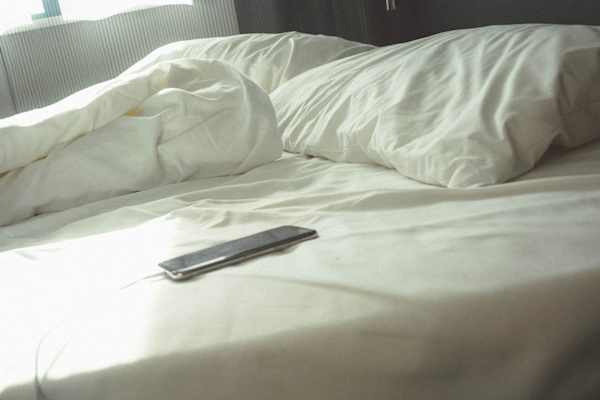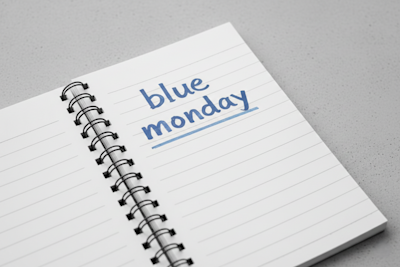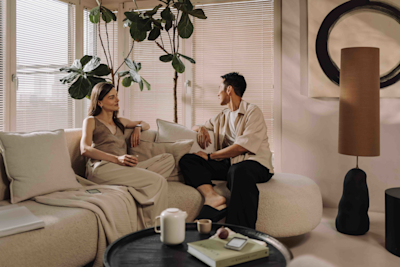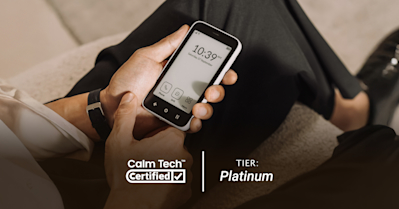
Screen Time & Sleep: How Digital Devices Affect Sleep
The impact of too much screen time
Screens are EVERYWHERE. They are in our homes, bedrooms, offices, vehicles, pockets and purses. We live in a digital era where the nature of our lifestyles makes it near-impossible to get away from digital screens.
It’s true, screens have become an integral part of human life. Many of us check our phones first thing in the morning and right before bed.
Excessive use of mobile technology can cause stress and anxiety. However, it affects our sleep the most.
When we get into bed in the evening, most of us don't fall asleep right away. We may scroll through social media, catch up on our favorite shows, or just browse through the internet. Substantial amount of time may pass by when we finally fall asleep, sometimes with our phone in our hand. In the morning, we wake up very tired. Sound familiar?
The latest research confirms that using a smartphone and browsing social media before bedtime can make it much harder to fall asleep.
Let’s explore the reasons how using digital devices before going to bed affects the quality of sleep.
Blue Light
The main reason not to use smartphones before bed is due to the blue light which is emitted by the screen. Although blue light is an inherent part of sunlight, the problem lies in the excess amount of it that we are currently experiencing in our daily lives. Blue light is emitted by all LCD screen devices, which have become some commonplace in our daily lives. We use them for work, staying in touch with friends & family, as well as entertainment and shopping. Blue light is also emitted by popular LED lighting.
For years, sleep experts have recommended that we remove TVs and laptops from our bedrooms. The problem is that while getting rid of those devices, we forget about the other sources of blue light emission. These include phones. Smartphones have become our constant companions, both during the day and at night. Several factors contribute to this fact, such as widespread social media use, as well as internet addiction. Furthermore, most of us use our smartphones as an alarm clock.
Turns out, according to published research, blue light can make it difficult to fall asleep. The human brain reacts to signals coming from outside, via the retina. Light is key, and its presence is a clear message to the brain - it’s daytime, you cannot sleep. To the eye and the brain, the blue light emitted from a smartphone screen is an imitation of daylight. To put it simply, blue light fools the brain into thinking it's daytime. As a result, it is difficult to fall asleep, the sleep quality is not good, and when you finally wake up in the morning, you may experience fatigue and be less alert throughout the day. Numerous studies confirm that blue light decreases the level of melatonin, which is responsible for the feeling of sleepiness. To improve your sleep hygiene, you may want to switch to a classic alarm clock, such as Mudita Bell or Mudita Harmony and create an offline bedtime routine in order to unwind and relax before bed. [1][2]
Experts at Brigham & Women's Hospital in Boston conducted a study which indicated that reading traditional paper books before bedtime does not disrupt the circadian rhythm, in the same way that blue light from an iPad or a smartphone might. Participants exposed to blue light from digital devices had difficulty falling asleep and had trouble waking up. They also experienced less quality sleep due to a shorter REM cycle.[3]
Your Brain vs. Digital Devices: information overload and falling asleep
Before going to bed, it's important to relax, unwind and quiet your mind. However, this is becoming increasingly impossible. The latest research confirms that using a smartphone and scrolling through social media or browsing the internet before bedtime can make it more difficult to fall asleep.
A 2014 report, titled "Bedroom of the Future" by the Infuture Hatalska Foresight Institute is full of alarming data. The findings show that one in four individuals suffers from internet addiction. Among young people, between the ages of 18 and 24, as many as 75% absorb a staggering amount of information before going to sleep. Professor Ryszard Tadeusiewicz from AGH University of Science and Technology in Krakow calls this phenomenon "information smog". The results of a study conducted by Nature magazine confirm these findings, stating that an average person consumes as much as 34 gigabytes of data, which amounts to approximately 100,000 words.
How does this relate to the issue of sleep disorders? Due to all this information overload, our minds are always racing, thinking, processing and digesting information. Your brain is never able to ‘turn off’ in order to properly recharge. It’s always on, on edge, ready for the next onslaught of information. This, in turn, can cause chronic stress.
The previously mentioned report by Infuture Hatalska Foresight Institute highlights the fact that information overload makes it difficult for us to fall asleep. Over 50% of participants surveyed struggled with this problem.
What Can You Do?
It’s important to know that there are simple steps you can take in order to fall asleep faster and get a better quality of sleep.
Arrange your schedule appropriately. Avoid blue light approximately 90 minutes before bedtime. Experts agree- avoid using smartphones or other digital devices with LCD screens before going to bed. Instead, read a traditional book or e-book using non-illuminated electronic paper.
Stop using your smartphone as an alarm clock. It's a good idea to steer clear of any devices that overwhelm us with excess data before bedtime, so that the brain can focus on regenerating rather than processing it. Sometimes avoiding blue light alone may not be enough.
Making small changes has the potential to greatly improve your sleep hygiene so you can get a better night’s rest.
If you’d like to read more about topics connected to this subject, please check out some of our other articles posted on our blog:
Also consider joining our Mudita Community on our forum.
Related stories

What is Blue Monday & How to Deal with Seasonal Blues
Feeling the winter blues? Discover how to overcome seasonal sadness with mindfulness, better sleep, limited screen time, and meaningful connections.

Why Disconnection Has Become a Modern Luxury
The world we live in demands constant availability. That’s why true offline time has become rare and very valuable.

Mudita Kompakt is Platinum Tier Calm Tech Certified™
Mudita Kompakt is Calm Tech Certified.™ Technology should serve your attention, not compete for it. Mudita Kompakt proves it’s possible.
If you'd like to receive the best stories from our blog, keep up to date with our progress and get notified about our product releases and special discounts.